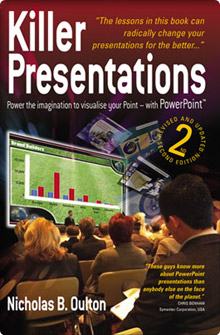
Audience Attention and Recall
People speak at around 125 words a minute but think considerably faster. When listening to a presenter, hearing the words takes a relatively small toll of the mind of an audience member, leaving them plenty of cognitive capacity to think about other stuff. Depending on what they do or are thinking about will determine how much of the information they will recall later.
As a presenter, your job is to do everything possible to ensure that they don’t drift to grocery lists, carpool schedules and other work tasks – one of our greatest challenges.
Passive and Active Listening
Listening happens on both passive and active levels. Passive listening is where you hear the words but think about something unrelated to them. Your kids do this when you are imparting very important information to them, occasionally glancing at you but really watching TV. They can often repeat what you just said, but you know they haven’t processed it.
Active Listening is where the audience processes the information presented, triggering a thought or question. Let’s say you’re presenting about the benefits of telecommuting. Can you do so in a way that causes the audience to consider the financial benefits of a virtual workforce? Less need for office space and therefore lower utility costs? Will it impact the way that teams are managed or the ability for executives to interact with people on the front lines?
Creating Cognitive Dissonance. What’s Cognitive Dissonance?
Your audience will be actively engaged in your presentation if you create some gaps in the information you are discussing. Cognitive dissonance creates a conflict of two or more ideas, forcing the listener to essentially form an opinion or pick a side. We then rely on the basic human need to be right to keep the audience waiting for an answer or resolution. In the meantime, they are listening, engaged and picking up key information points that support their opinion. This is the stuff they will remember, ask questions about and discuss after you have left the podium.
